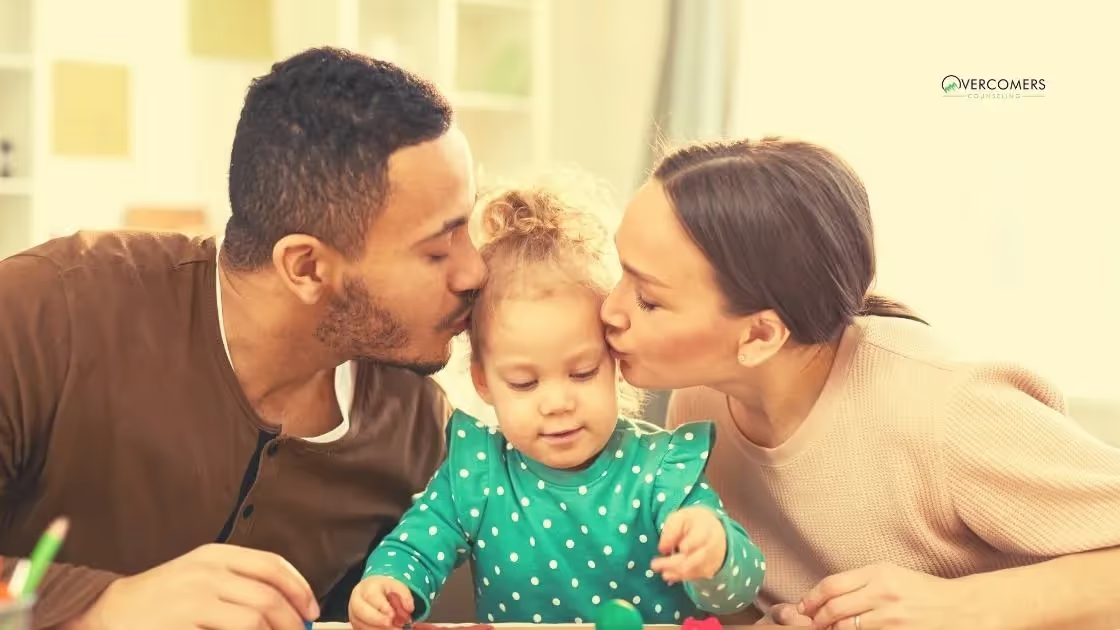The significance of the parent-child bond is crucial, yet sometimes underestimated. A positive parent-child relationship profoundly affects a child's...

The significance of the parent-child bond is crucial, yet sometimes underestimated.
A positive parent-child relationship profoundly affects a child's development, both now and in the future.
For parents striving to strengthen this bond, spending quality time and nurturing mutual respect are essential, even if their own upbringing lacked these elements.
Some may overlook its importance, believing that meeting basic needs is sufficient, but a strong relationship is foundational for a child's emotional and intellectual growth.
We are committed to assisting parents in fostering a positive parent-child relationship, providing support and guidance through parenting counseling.
So now we've seen how important it is to develop this relationship. Now it is time for us to talk about the "how"� how do you build this healthy parent-child relationship?
Here are some ways to build a healthy and positive parent-child relationship.
It is said� better late than never, but in a parent-child relationship, it can be too late. This is why you must start early to build a good relationship with your child. For mothers, a bond is built straight from the womb. While for fathers, a bond is built once the baby is born.
As your baby goes from a newborn to an infant, a toddler, preschool, and school-age be a part of their life.
Spend as much quality time with them as possible. Yes, you are working hard and sometimes you get exhausted. Spending a couple of minutes to play and care for your child every time you are around them goes a long way. When you do this, even as your child grows older there won't be a cloud of unfamiliarity hovering over you both. You can take your kids to the park, attend all or most of their school events or be present during any moment that is of major importance to them.
Children are less likely to bond with you if you exhibit certain negative traits. Traits like yelling, physical, emotional, and verbal abuse.Speak to your child with love and care. Tell them how much you love them, and how proud you are of them. Also, teach your child to love themselves, and help them build their self-esteem and self-worth. Even when you have to discipline or scold them, let them know the reason why you did it. Show them it's coming from a place of love not hate.
Some parents may find it strange or belittling to play with their kids. If you feel that way, throw away that mentality into the trash can. Yes, playing with kids may not be fun for you but it's fun for them. And that is what really matters. The good thing is as your kids get older you can find a thing or two you both have an interest in, it could be a sport or any recreational activity.
There is no easier way to bond with a child than over something you both love.If you have nothing in common, you could try picking an interest in an activity your child enjoys. You could even make Tiktoks with your child.
As important as talking to your child is, talking with them is also crucial. Give your child the chance to express their feelings and even opinions.
Ensure to make conversations fun, lively, and interesting so your child can open up to you. You can start this when they are in their preschool age. Although, conversations with preschoolers may be hard to follow and may make no sense. But preschoolers always have a lot to say, so all you have to do is listen.
Eventually, as your child grows older, you can start having more meaningful conversations. You won't need to force it because it would have become a habit.
You should also understand when your child doesn't want to talk. In those moments, give them space but be ready to offer a listening ear when they are ready to speak.

Children need encouragement. It is your job as a parent to give it to them as many times as possible.
If your child makes a mistake, encourage them to try again. Encourage them to try new things- food, games, and even toys.
If your child didn't do well in a test or a school year.
Commend them first for trying and encourage them to do better next time.
There are families where the children don't respect their parents. In most cases, this happens because the parents did not accord the child respect from the beginning.
Respect is reciprocal. To receive it, you must give it. Show your child how much you value and respect their opinions.
Before making certain decisions that would affect them. Ask for their advice or opinion, even if you won't take it into consideration. The child will see that their thoughts are respected and valued.
Treat your child as an individual, and let them have a say in the affairs of the home. Respect their views and they will respect you.
Main Points Elaboration Start Bonding With Your Child Early Building a strong relationship with your child begins early, especially for younger children. Many parents find that investing in one on one time during the early years is crucial for creating a positive relationship with your child. Invest Time And Effort In Your Child Spending quality time is essential to nurture relationships. Despite the challenges of modern life and parenting stress, finding time to engage with your child enhances family life and supports the child's self-esteem. Speak Positively To Them Positive parenting involves speaking to your child with love, which helps in developing their self-esteem. Children learn respect and develop a healthy relationship when their feelings are acknowledged. Play With Your Kids Playing together offers a unique perspective into your child's world. It strengthens the bond, allowing both younger and older kids to feel valued, thereby maintaining a positive relationship with your child. Talk With Your Child Engaging in conversations helps you understand your child's perspective and own emotions. Most parents find that a family meal offers a perfect setting to talk, reducing parenting stress and ensuring a healthy relationship. Encourage Your Child Offering encouragement helps children learn resilience. It is vital to support them in trying new things, thereby boosting their confidence and reinforcing a positive parenting approach. Respect Your Child Respecting your child's opinions nurtures mutual understanding and respect. This practice is key to maintaining a relationship healthy and ensuring positive interactions within the family.
Raising a child or children is not an easy job. While you're doing your best to provide financially for them, you may overlook other areas that are important to your child's wellbeing. To prevent this, you have to make an active effort to be present in their lives. Talk to and with, play, respect, encourage and speak positively to your child. If you do all of this, you are bound to have a healthy parent-child relationship.
https://www.momjunction.com/articles/helpful-tips-to-strengthen-parent-child-bonding_0079667/
You can teach your child persistence by modeling the behavior yourself, encouraging them to take risks, setting goals and tracking progress, praising effort, and providing support and guidance.